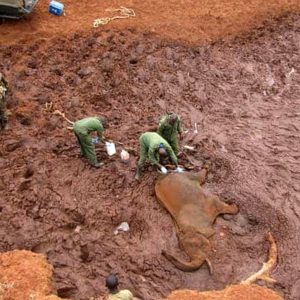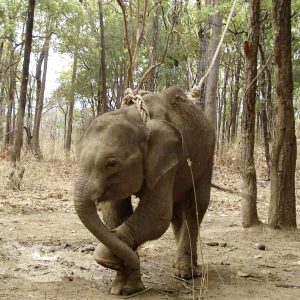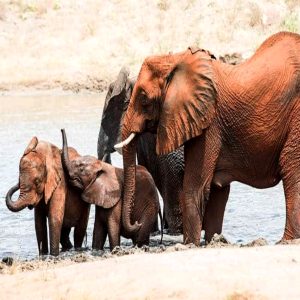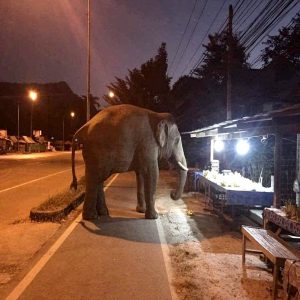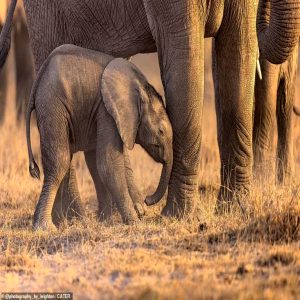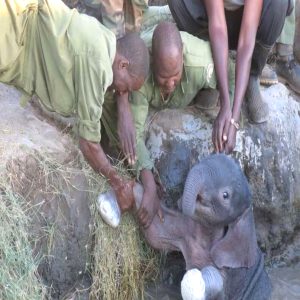Let’s face it. When it comes to paternal instincts in the animal kingdom, there are more than a couple of lousy dads. In the natural world, a majority of dad critters are programmed to produce as many heirs as possible without sticking around to take care of their offspring.
However, there are some exceptions to this trend that dominates the parenting scene in the animal kingdom. In fact, in some species, the proud father plays an integral role in raising the young along with—or sometimes in place of—the mother. Here are ten standout fauna fathers that could teach us a thing or two about parenting.
Seahorses
:max_bytes(150000):strip_icc():format(webp)/short-snouted-seahorse--hippocampus-hippocampus---male-with-eggs--black-sea--crimea--ukraine-487696857-c776bfab774145cb801fb87e3068ef76.jpg)
Seahorses are unique because they belong to the fish family Syngnathidae, a family characterized by male pregnancy. Male seahorses have a pouch where females deposit their eggs. Once deposited, the male fertilizes the eggs and incubates them for a period of up to 45 days until they emerge as fully developed little seahorses. Seahorse fathers have a distended stomach during pregnancy and even experience contractions as they give birth.
Scientific American writes, “It is unknown why seahorses have this sex reversal when it comes to procreation, but one idea is that having the male bear young leaves the female free to start producing the next batch of eggs.”
Marmosets
:max_bytes(150000):strip_icc():format(webp)/monkey-mon-and-her-three-monkey-cubs-1252803941-e1aadd4b03124b3385c8a222241d9e19.jpg)
Leonardo Costa Farias / Getty Images
Sure, the small and furry tree-dwelling primates known as marmosets are outrageously cute, but male marmosets also take their roles as fathers very seriously. With the help of other family members, including older siblings, the typical marmoset dad grooms, feeds, and gives piggyback rides to his infant children while the marmoset mom steps away and takes on a decidedly disinterested parenting role after a few weeks. Marmoset fathers will also act as attentive midwives during the birth of their newborns, going as far as to clean up the afterbirth and bite off the umbilical cord.
Jeff French, primatologist at the University of Nebraska Zoo, tells National Geographic that one reason the marmoset dad is so involved is because of the tremendous physical strain put on the expectant mother. “It’s like a 120-pound (55-kilogram) woman giving birth to a 30-pound (14-kilogram) baby,” explains French.
Jacanas
:max_bytes(150000):strip_icc():format(webp)/pheasant-tailed-jacana-529109581-b593c08795584a6180c5bcbd1a4497dd.jpg)
Male jacanas do all the hard work of making the nests, incubating the eggs, and caring for the chicks. While female jacanas gallivant around and mate with as many males as they can, the males make for loyal homemakers, even choosing to stay with the nest long after females have left on their migration. They’re such loyal fathers that they will even care for eggs fertilized by other males. Females will occasionally help out to scare away predators, but otherwise enjoy building harems of up to five males.
Arowanas
:max_bytes(150000):strip_icc():format(webp)/arowana-fish-485352678-421737c0898c4fdbb396473a2d4a90d6.jpg)
Father arowanas exhibit some of the most extensive paternal care among fish. Aside from building nests for their young and protecting them after they hatch, arowanas are also notable for being mouthbrooders, carrying their marble-like eggs in their mouths until they hatch. But even after hatching, arowana fathers continue to harbor hundreds of baby fish in their mouths, letting them out only on occasion to explore. However, the dad always takes special care to seek out each one of his offspring and suck them back into his mouth to keep them safe from predators. Check out this video to see a mouthbrooding arowana in action.
Emperor Penguins
:max_bytes(150000):strip_icc():format(webp)/emperor-penguin-with-egg-177303635-04c1221a1331444382e730d5c0f2d52f.jpg)
There are few examples in nature of a father more dedicated to their offspring than the emperor penguin. After the female lays an egg, her nutritional reserves become depleted and she must return to feed in the ocean for two months. This leaves the responsibility of keeping the egg warm through the freezing Antarctic winter to the father. The emperor penguin dad spends two months holding the egg precariously between the tops of his feet and his brooding pouch. Throughout the brutal winter, when freezing winds can reach 120 mph, the father doesn’t eat anything, dedicating all his time to incubating the egg.
Rheas
:max_bytes(150000):strip_icc():format(webp)/nestbabes-478402901-dbcb5de7e36842eca865c91ef2cc6658.jpg)
RJHeurung / Getty Images
Much like the emperor penguin, the rhea is a large, flightless species of bird from South America in which the males dutifully incubate the females’ eggs until they hatch. However, the male rhea, an ostrich lookalike and member of the ratite family, is polygamous, courting up to 12 females at a time. Despite their wandering eyes and many mates, male rheas never abandon their offspring. In addition to incubating as many as 50 eggs at a time for six weeks, the rhea father is in charge of nest-building and is responsible for raising the chicks for the first six months without any assistance from their mothers. Sadly, these birds are considered “Near Threatened” by the International Union for Conservation of Nature due to habitat loss driven by cattle ranching.1
Lumpsuckers
:max_bytes(150000):strip_icc():format(webp)/cyclopterus-lumpus--the-lumpsucker-or-lumpfish-1198288065-4f3b9a98b1e8415c9baedf69f1aba365.jpg)
They may not be the prettiest of animals, but little lumpsuckers are always beautiful in their fathers’ eyes. Lumpsucker fathers are particularly notable for their dedication to looking over their brood until the eggs hatch. The father uses his modified pelvic fins, which have essentially evolved into suction cups, to glue himself to a surface near the eggs. Then, he sits and watches over his spawn until they hatch. He aerates the eggs by waving his fins over them to provide oxygen. Predators such as crabs, sea stars, and small fish are met with a fierce display of protectiveness if any attempt is made to harm the eggs.
Frogs
:max_bytes(150000):strip_icc():format(webp)/frogs-and-frogspawn-160196627-77baba22972c486982457a71601a22fc.jpg)
Perhaps no group of animals contains so many dedicated fathers as frogs and toads. There are frog fathers that carry their tadpoles in their mouths, often refusing to eat until the tadpoles are old enough to survive on their own. Other frog fathers embed their spawn inside their skin, often on their backs or legs, such as with the aptly named midwife toad. In one frog species called the pouched frog, males even have a specialized pouch to carry their young while they mature, just like female marsupials.
Giant Water Bugs
:max_bytes(150000):strip_icc():format(webp)/GettyImages-156266595-c2f1f4c1479047d88264b58223dd11af.jpg)
jaki good photography – celebrating the art of life / Getty Images
Those aren’t ordinary lumps on the back of this male water bug—those are his children. Giant water bugs display the most dedicated paternal care in the insect world by carrying eggs on their wings until they hatch. Sometimes they carry as many as 150 eggs for a week at a time.
You’ll want to avoid messing with a water bug father because he can deliver one of the most painful bites among insects, which explains why this bug is sometimes called a “toe-biter.” For these dads, it’s all about protecting themselves and their eggs.
Wolves
:max_bytes(150000):strip_icc():format(webp)/wild-wolf-and-her-puppie-163700413-e5cca70f216d4f5d9ea60c3ceb25b137.jpg)
Despite their fearsome reputation as apex predators, male wolves are attentive, monogamous, and fiercely protective dads that live with their mates for life. A wolf pack is a family group made up of a male and female pair and their cubs. After a female wolf gives birth, she sticks close to her helpless pups and doesn’t leave her den for several weeks. Meanwhile, the dad stands guard and hunts for food to share with his new family since pups can start eating meat at three weeks old. Whereas a female wolf will regurgitate meat to share with a litter, the dad will provide entire pieces of fresh kill. As a young pup grows, the dad takes on the role of a stern but sometimes playful mentor, helping integrate the pup into the pack.
